

Millions Of Patient Medical & Financial Records Hacked. A data breach has demonstrated that adoption of digital record storage systems may be making patient privacy vulnerable; this breach involves close to 12 million patients who got blood testing through Quest Diagnostics who may have had their personal records hacked according to reports.
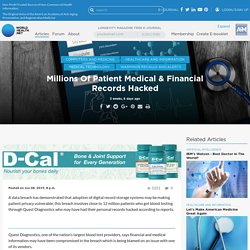
Quest Diagnostics, one of the nation’s largest blood test providers, says financial and medical information may have been compromised in the breach which is being blamed on an issue with one of its vendors. Between 08/01/2018 and 03/30/2019 someone was able to gain unauthorized access to the computer system of AMCA which is a billing collections vendor contracted by Quest according to a securities regulator filing.
Affected information in AMCA’s system includes financial information such as banking information and credit card numbers, medical information, and other personal information such as social security numbers. Www.wired. Hacked medical devices make for scary headlines.
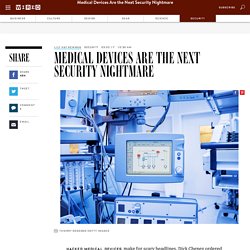
Dick Cheney ordered changes to his pacemaker to better protect it from hackers. Johnson & Johnson warned customers about a security bug in one of its insulin pumps last fall. And St. Jude has spent months dealing with the fallout of vulnerabilities in some of the company’s defibrillators, pacemakers, and other medical electronics.
You’d think by now medical device companies would have learned something about security reform. As hackers increasingly take advantage of historically lax security on embedded devices, defending medical instruments has taken on new urgency on two fronts. “The entire extortion landscape has changed,” says Ed Cabrera, chief cybersecurity officer at the threat research firm Trend Micro. The Internet of Health Care Implanted medical device hacks are so memorable because they’re so personal. Given the prevalence of connected medical devices, there’s a lot of exposure to go around. MedJack Be Nimble Make It Work. Who controls your medical data?
Ohio man’s pacemaker data may betray him in arson, insurance fraud case. The Brilliant Drone That’ll Deliver Medicine—Then Rot Away. When most people hear the word “drone” they either think of uncrewed military aircraft or those multi-rotor mini-copters that could one day deliver packages to your doorstep.
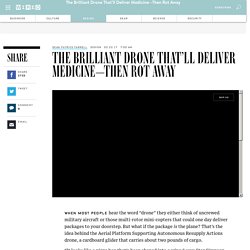
But what if the package is the plane? That’s the idea behind the Aerial Platform Supporting Autonomous Resupply Actions drone, a cardboard glider that carries about two pounds of cargo. “It looks like a pizza box that’s been shaped into a wing,” says Star Simpson, an engineer at San Francisco robotics company Otherlab. Her team designed and built Apsara with funding from Darpa, which challenged them to develop a single-use delivery vehicle for emergency scenarios. But, Darpa being Darpa, there was a twist: The drones had to not only carry a small payload and land where you told them to—once they were on the ground, they had to disappear. Cardboard was an obvious choice. Cardboard is the first step on the path toward drones that degrade quickly and completely. That’s important. Go Back to Top.
Médecine exponentielle, vie exponentielle, Séminaire le Vendredi 31 mars 2017 à l'Ecole Polytechnique à Palaiseau, Amphithéâtre Becquerel Les technologies du numérique ont envahi notre univers quotidien professionnel et personnel.
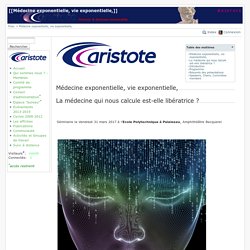
Même si le numérique et la médecine se côtoient depuis un certain nombre d’années, une accélération se produit, augmentant le champ des possibles. Le premier génome humain a été décodé il y a plus de 10 ans et ce fut à l’époque un exploit qui a coûté 1 milliard de dollars. Désormais les procédés sont accessibles aux particuliers pour 140$, bientôt pour 5$, ils permettent de passer à une analyse systématique des génomes et de constituer ainsi des bases de données génomiques augmentées des données provenant des instruments (scanner, IRM …), des prélèvements en temps réel via les objets connectés, du dossier médical numérique … pour arriver au Big Data de la médecine.
Partenaires : Coordination scientifique : Téléchargez l'affiche du séminaire ...et le programme Inscription en ligne obligatoire. Manufacturer Disclosure Statement for Medical Device Security (MDS2) 9 key things about GDPR that Health App Developers need to know. The EU General Data Protection Regulation (GDPR), is a new legal instrument that harmonises privacy rules for all European Union Member States.
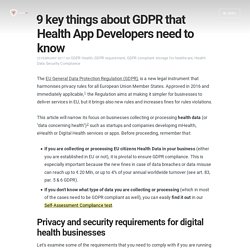
Approved in 2016 and immediately applicable,1 the Regulation aims at making it simpler for businesses to deliver services in EU, but it brings also new rules and increases fines for rules violations. This article will narrow its focus on businesses collecting or processing health data (or "data concerning health")2 such as startups and companies developing mHealth, eHealth or Digital Health services or apps. Before proceeding, remember that: If you are collecting or processing EU citizens Health Data in your business (either you are established in EU or not), it is pivotal to ensure GDPR compliance. Privacy and security requirements for digital health businesses Let's examine some of the requirements that you need to comply with if you are running a digital health business and you are processing health data. [^3] See art. 4, par. 12 GDPR.